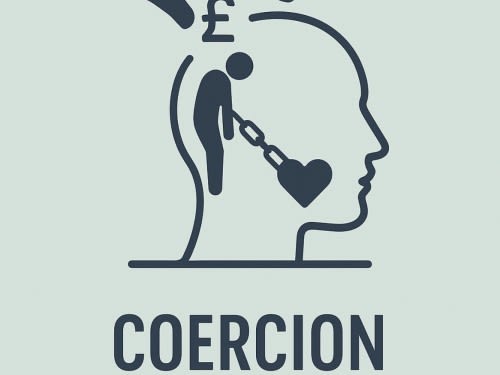Psychological Coercion

posted 19th May 2025
Psychological Coercion and the Illusion of Consent: Understanding Power, Dependency, and Control in Abusive Dynamics
As the ongoing investigations surrounding Sean "Diddy" Combs continue to unfold, they have brought renewed public attention to a difficult and often misunderstood psychological reality: the nature of coercion, manipulation, and the erosion of genuine consent. While legal proceedings must ultimately determine the truth of any specific case, it is crucial to understand how coercive dynamics can operate within relationships where power, wealth, and psychological influence are unequally distributed.
Coercion vs. Consent: The Psychological Distinction
At a glance, an outsider might ask: Why didn’t the person leave? Why did they comply? The implication is that any action taken without physical restraint must be freely chosen. But in psychological terms, consent requires more than the absence of physical force. It demands the absence of undue influence. Coercion exists when a person's ability to exercise free will is systematically undermined—through fear, manipulation, emotional dependence, and financial control.
Power Differentials and Gradual Conditioning
In cases involving celebrities, high-profile figures, or wealthy individuals, the power imbalance is often stark. The person in control may have status, money, legal resources, and social influence. This imbalance does not always manifest as overt threats. More often, it is insidious: it begins with charm, generosity, and promises of protection or opportunity. Over time, this builds psychological reliance.
Psychologically, this is known as trauma bonding or coercive control. It is a slow erosion of autonomy. The victim is conditioned to tolerate and rationalise the abuser's behaviour, sometimes even to protect them. This psychological conditioning is often reinforced through cycles of idealisation, devaluation, and intermittent reward—a hallmark of narcissistic or abusive dynamics.
Emotional Blackmail and Dependency
A key mechanism of coercion is emotional blackmail. This may involve:
Threats to withdraw love, support, or protection
Guilt-tripping and shaming
Alternating between affection and cruelty to destabilise the victim
Using secrets or past actions against the victim as leverage
Over time, the victim becomes emotionally and practically dependent. The cost of resistance grows higher. Leaving may mean losing financial support, housing, social status, or safety. In some cases, it may mean risking retaliation or being discredited publicly.
The Role of Money and Isolation
- Financial dependence is a potent tool of control. The abuser may:
- Control access to funds
- Offer luxurious rewards for compliance
- Threaten poverty or ruin for non-compliance
Often, the victim becomes socially isolated. The controller may alienate them from friends, family, or anyone who might challenge their influence. This isolation strengthens the abuser's grip, and reduces the victim's perspective on what is "normal".
When Is It Consent, and When Is It Coercion?
The answer lies in autonomy. True consent requires:
- Access to alternative choices
- Freedom from threats (explicit or implicit)
- Psychological clarity
- The ability to say "no" without fear of punishment
When these are absent, the situation cannot be ethically or psychologically regarded as consensual, regardless of outward compliance.
Why This Matters
Cases like the one currently under scrutiny demand that we, as a society, deepen our understanding of psychological abuse. Victims of coercive control often struggle to name or explain what they have experienced until long after the fact. The law is only just beginning to catch up with these nuanced realities.
In clinical terms, what may appear to be "compliance" is often a survival strategy. What may look like choice may, in truth, be coercion wrapped in emotional, financial, and social dependency. To judge these cases fairly, we must move beyond simplistic ideas of freedom and into the complex psychological territory where power, control, and manipulation obscure the line between yes and no.



